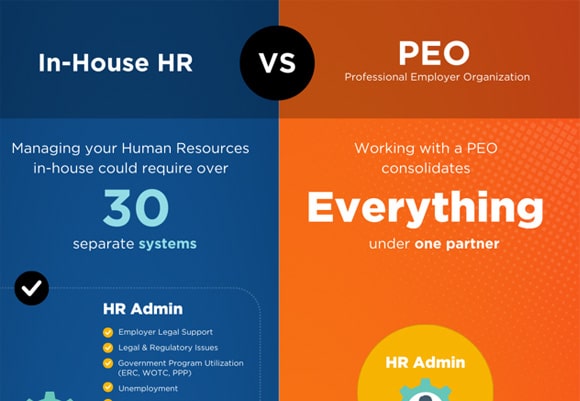In today’s ever-evolving business landscape, organizations are constantly seeking ways to streamline their operations, drive growth, and save time and money. One crucial aspect of any successful business is its human resources department.
The HR function plays a vital role in managing a company’s most valuable asset – its employees. But with the complexities and challenges of HR management, many businesses are turning to professional employer organizations (PEOs) and human resources outsourcing (HRO) providers for assistance.
But what exactly is the difference between a PEO and an HRO? In this article, we will unravel the benefits and features of these two HR solutions to help you make an informed decision.
What is a PEO?
A PEO, or professional employer organization, is a comprehensive HR solution that enables businesses to outsource the management of their employees’ HR needs. When you partner with a PEO, you essentially enter into a co-employment relationship, where the PEO becomes the employer of record for tax purposes, payroll processing, benefits administration, and other HR responsibilities. This arrangement allows the PEO to take on the legal and administrative burdens associated with HR management, while the client company retains control over day-to-day operations and strategic decision-making.
What is an HRO?
An HRO, or human resources outsourcing provider, is a company that specializes in providing a wide range of HR services to businesses. Unlike a PEO, an HRO does not enter into a co-employment relationship with the client company. Instead, the HRO acts as a third-party provider, offering services such as payroll processing, benefits administration, compliance management, employee training, and recruitment support. The client company maintains full control over their employees and HR operations, while the HRO handles the specific tasks and responsibilities outsourced to them.
Benefits of an HRO
1. Flexibility
HROs offer a flexible arrangement where businesses can choose specific HR services based on their needs. This allows businesses to customize their HR solutions and only pay for the services they require.
2. Expertise and Efficiency
HROs specialize in HR services and have a deep understanding of best practices and industry standards. By outsourcing to an HRO, businesses can benefit from their expertise and ensure that HR tasks are handled efficiently and accurately.
3. Focus on Core Business
By outsourcing HR functions to an HRO, businesses can free up valuable time and resources to focus on their core competencies and strategic initiatives. This can lead to increased productivity and growth.
Benefits of a PEO
1. Cost Savings
By outsourcing HR functions to a PEO, businesses can save money on hiring and training HR staff, as well as on payroll processing, benefits administration, and compliance management.
2. Expertise and Resources
PEOs have specialized knowledge and experience in HR management, allowing them to handle complex tasks with efficiency and accuracy. They also have access to advanced HR technology and resources that may not be available to small or mid-sized businesses.
3. Scalability:
PEOs can easily scale their services up or down depending on the business’s growth or changing needs. This flexibility allows businesses to adapt their HR solutions as their workforce and operations evolve.
4. Compliance and Risk Management
PEOs stay up-to-date with changing labor laws and regulations, ensuring that the client company remains compliant. They also help mitigate HR-related risks, such as employee lawsuits or penalties for non-compliance.
5. Employee Benefits
PEOs often have access to a wide range of benefits options and can negotiate better rates and coverage due to their collective purchasing power. This allows small and mid-sized businesses to provide competitive benefits packages that rival those offered by larger corporations.
Additionally, PEOs can handle all aspects of benefits administration, from enrollment and eligibility tracking to claims management and employees receive the support they need when it comes to their health insurance, retirement plans, and other benefits, without placing a burden on your HR team.
By outsourcing benefits administration to a PEO, you can free up valuable time and resources that can be better spent on core business activities. This not only saves you money but also allows you to focus on driving growth and success for your company.
6. Streamlined Payroll Processing
Processing payroll can be a complex and time-consuming task. A PEO can handle all aspects of payroll, from calculating wages to tax withholding and filing. With their expertise and advanced payroll systems, you can ensure accurate and timely payments, eliminating the need for manual calculations and paperwork.


